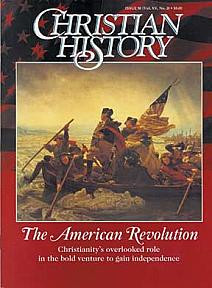What Did the Continental Congress Make Its Top Priority?
ON THIS DAY, 6 SEPTEMBER 1774, the Continental Congress made its first official act. The delegates had assembled in Philadelphia a day earlier and elected Peyton Randolph their president. Now they considered a motion by Thomas Cushing, a delegate from Massachusetts, that the daily sessions be opened with prayer.*
John Jay (a Congregationalist) and Mr. Rutledge of South Carolina opposed the idea, saying there were too many religious differences among the colonists for them to join in the same worship. Samuel Adams, also a Congregationalist, arose and said that he was “no bigot, and could hear a prayer from any gentleman of piety and virtue, who was at the same time a friend to his country.” He suggested Jacob Duché, a highly respected Protestant Episcopal clergyman. Since southerners considered the New England Protestants to be radicals, this was a wise move, as the Episcopalians were well established in southern states.
The motion passed. The next morning Duché read the Collect (prayer) and the Psalm appointed for the day, Psalm 35, which opens: “Plead my cause, O Lord, with them that strive with me.” This seemed especially fitting to the delegates, who had just learned of a British attack on Boston.
John Adams wrote to his wife Abigail, “I never saw a greater effect upon an audience. It seemed as if Heaven had ordained that Psalm to be read on that morning.”
Adams continued,
“After this, Mr. Duché, unexpected to everybody, struck out into an extemporary prayer, which filled the bosom of every man present. I must confess I never heard a better prayer, or one so well pronounced, Episcopalian as he is. Dr. Cooper himself never prayed with such fervor, such earnestness and pathos, and in language so elegant and sublime—for America, for Congress, for the Province of Massachusetts Bay, and especially the town of Boston. It had an excellent effect upon everybody here.”
Duché later switched sides, becoming a Royalist, and fled to England. Patriots denounced him as a turncoat. The Continental Congress appointed two chaplains in his place. After the Constitution came into effect, House and Senate continued the tradition of chaplains for their respective chambers. One of the best known of recent times was Peter Marshall.
—Dan Graves
———————-
* Although the official transcript ascribes the motion to Cushing, James Caldwell of New Jersey claimed that it was his motion.
For more on the Revolutionary war, see Christian History #50, American Revolution: Christianity’s Overlooked Role
Other Events on this Day
- LATIN AMERICANS BREWED NEW THEOLOGY IN MEDELLÍN
- Bob Pierce Aided World Christians but LOST His Own Family






